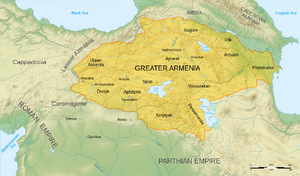Greater Armenia
| Author:Laxman Burdak, IFS (R) |


Greater Armenia is the name given to the Armenian state that emerged on the Armenian Highlands during the reign of King Artaxias I at the turn of the 2nd century BC.
Variants
- Greater Armenia (Armenian: Մեծ Հայք)
- romanized: Mets Hayk
- Armenia Maior (Latin)
- Armenia Megale (Ἀρμενία Μεγάλη)
Jat Gotras Namesake
History
The term 'Greater Armenia' was used to refer principally to the fifteen provinces that made up Armenian kingdoms throughout the classical, late antique, and medieval periods by contemporary Armenian and non-Armenian authors alike.[1]
Extent
Though its borders were never exactly defined, Greater Armenia usually referred to the stretch of land beginning from the Euphrates River to the west, the region of Artsakh and parts of what are now Azerbaijan and Iranian Azerbaijan to the east, parts of the modern state of Georgia to the north, with its southern boundary rounding the northern tip of Mesopotamia.
The Romans referred to it in Latin as Armenia Maior while the Greek-speaking peoples called it Armenia Megale (Ἀρμενία Μεγάλη), to differentiate it from Lesser Armenia (Pok'r Hayk′, in Latin Armenia Minor).[2] It would later be used to distinguish it from the medieval kingdom that was established in Cilicia, which was sometimes referred to as Little Armenia (not to be confused with Lesser Armenia).
Mention by Pliny
Pliny[3] mentions.....Adjoining the other front of Greater Armenia, which runs down towards the Caspian Sea, we find Atropatene7, which is separated from Otene, a region of Armenia, by the river Araxes; Gazæ8 is its chief city, distant from Artaxata four hundred and fifty miles, and the same from Ecbatana in Media, to which country Atropatene belongs.
7 There is great difficulty in ascertaining, from the accounts given by the ancient writers, the exact limits of this district, but it is supposed to have included a considerable portion of the province now known by the name of Azerbaijan. It derived its name from Atropates or Atropes, who was governor of this district under the last Darius.
8 Most probably the place now known as Gazæa, the royal residence of the Parthian kings, and, as its name would imply, their treasure city. Colonel Rawlinson thinks that this place underwent many changes of name according to the rulers who successively occupied it; among other names, it appears to have borne that of Ecbatana.
External links
See also
References
- ↑ Hewsen, Robert H. "The Geography of Armenia," in The Armenian People from Ancient to Modern Times, vol. 1: The Dynastic Periods: From Antiquity to the Fourteenth Century, ed. Richard G. Hovannisian. (New York: St. Martin's Press, 1997), p. 15.
- ↑ (in Armenian) Yeremyan, Suren. "Mets Hayk'," Armenian Soviet Encyclopedia, vol. 7, pp. 434-36.
- ↑ Natural History by Pliny Book VI/Chapter 16

